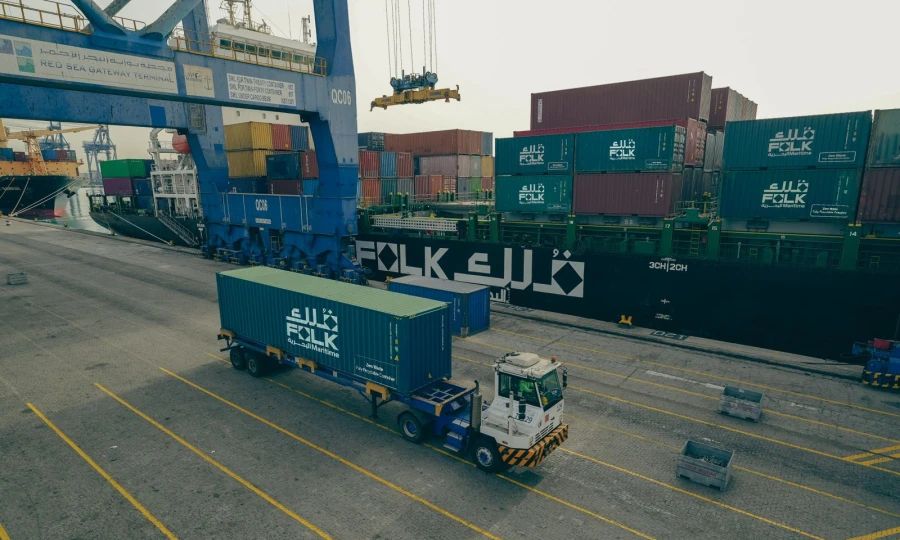-
Name: M/V Folk Yanbu
-
Type: Container Vessel (Feeder)
-
Capacity: 702 TEUs (Twenty-foot Equivalent Units)
-
Flag: Saudi Arabia
-
Port of Registry: Jeddah Islamic Port
-
IMO Number: Not specified in available data
-
MMSI/Call Sign: Not specified in available data
-
Build Details: Specific build year, shipyard, or technical details (e.g., length, beam, draft) are not publicly detailed in the provided sources. Feeder vessels of this size typically range from 100-150 meters in length and have drafts suitable for regional ports (e.g., 6-8 meters).
-
Acquisition: Acquired by Folk Maritime in May 2025 as part of a fleet expansion alongside two other vessels, M/V Folk Dammam (1,868 TEUs) and M/V Folk Jubail (1,118 TEUs).
-
Deployment: The vessel is being deployed to enhance Folk Maritime’s operational capacity across the Red Sea, Arabian Gulf, Indian Subcontinent, and other key regional trade routes. It is expected to enter service within a month of the May 2025 announcement.
-
Routes:
-
Likely involved in the Port Sudan Service (PSS), which operates a 700 TEU vessel fortnightly between Jeddah and Sudan, as the Folk Yanbu’s capacity matches this service.
-
May also support other routes like the North Red Sea Service (NRS) (Jeddah, Neom, Ain Sokhna, Aqaba, Yanbu) or India Red Sea Service (IRS) (Nhava Sheva, Mundra, Jeddah), depending on operational needs.
-
-
Purpose: Strengthens Folk Maritime’s feeder services, connecting smaller regional ports to larger hubs, facilitating trade in consumer goods, petrochemicals, and other commodities.
-
Operator: Folk Maritime Services Company, headquartered in Riyadh, Saudi Arabia. Backed by the Public Investment Fund (PIF), the company aims to position Saudi Arabia as a global logistics hub.
-
Leadership: Led by CEO Poul Hestbaek, former head of Hamburg Süd, with a management team including CCO Saleem Kadernani, CFO Khalid Fawzi, and Chief HR Officer Abdulrahman Alshangiti.
-
Fleet Context: The Folk Yanbu is one of five owned vessels in Folk Maritime’s fleet as of May 2025, alongside Folk Jeddah (1,868 TEUs), Folk Jazan (2,015 TEUs), Folk Dammam (1,868 TEUs), and Folk Jubail (1,118 TEUs). The company also operates three chartered vessels, totaling eight ships.
-
Strategic Role: The Folk Yanbu supports Saudi Arabia’s goal of reducing reliance on chartered vessels and building a Saudi-flagged fleet. It aligns with Vision 2030’s aim to enhance regional trade and connectivity.
-
Sustainability: Folk Maritime emphasizes maritime decarbonization, compliance with IMO regulations, and sustainable practices, though specific environmental features of the Folk Yanbu are not detailed.
-
Digitalization: The vessel likely benefits from Folk Maritime’s use of smart port technologies, real-time tracking, and paperless documentation to streamline operations.
-
Data Gaps: Specific technical details (e.g., IMO number, build year, dimensions) are not available in the provided sources. Feeder vessels of 700 TEUs are typically smaller, designed for short-sea routes, and may be older or refurbished ships, but no confirmation exists for the Folk Yanbu’s history.
-
Verification: For precise details, you may need to contact Folk Maritime directly (via their website, folkmaritime.com) or check maritime databases like VesselFinder or MarineTraffic with the vessel’s IMO number (if available).
-
Relevance to Yanbu Port: The vessel’s name and operations tie to Yanbu, a key Saudi port on the Red Sea, which handles containers, bulk cargo, and industrial goods. The Folk Yanbu likely calls at Yanbu as part of its routes.
Saudi Arabian liner newcomer Folk Maritime is pressing ahead with fleet expansion by adding three more vessels.
The Riyadh-based feeder owner and operator, led by former Hamburg Süd boss Poul Hestbaek, has acquired the 702 teu Folk Yanbu, 1,118 teu Folk Jubail and the 1,868 teu Folk Dammam, taking its owned fleet to five ships.
The company, backed by Saudi Arabia’s Public Investment Fund, entered shipowning last September with the acquisition of the 1,868 teu Folk Jeddah, which was followed by the 2,015 teu Folk Jazan in April this year.
The operational fleet now stands at eight vessels, of which three are chartered in.
“This expansion not only supports Folk Maritime’s ambitions to expand fleet capacity but also reinforces our commitment to reducing reliance on chartered vessels and investing in Saudi-flagged assets,” noted Hestbaek, chief executive of Folk Maritime.
The latest additions should be deployed over the next month and registered under the Saudi flag at Jeddah Islamic Port, Folk Maritime said, adding that they would bolster its capacity across the Red Sea, Arabian Gulf, Indian subcontinent, and key regional trade routes.
We give you energy news and help invest in energy projects too, click here to learn more

